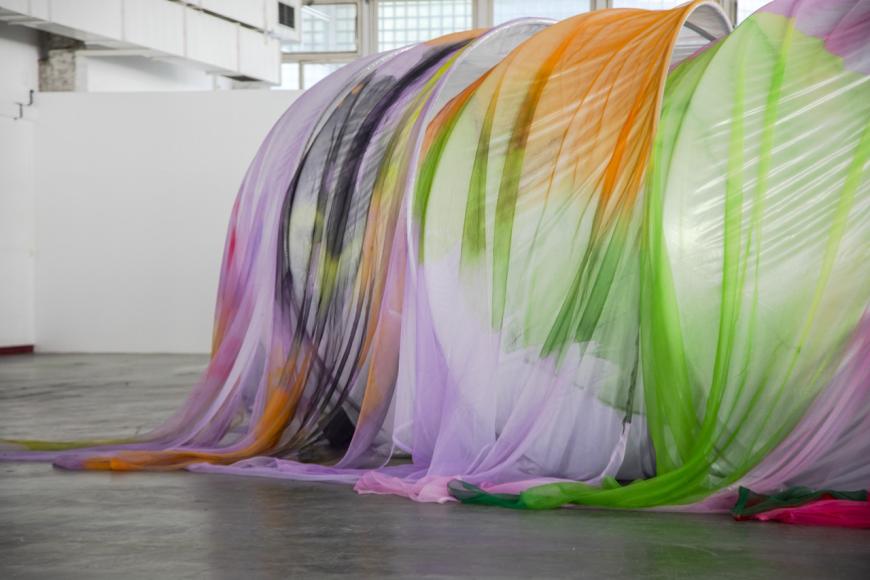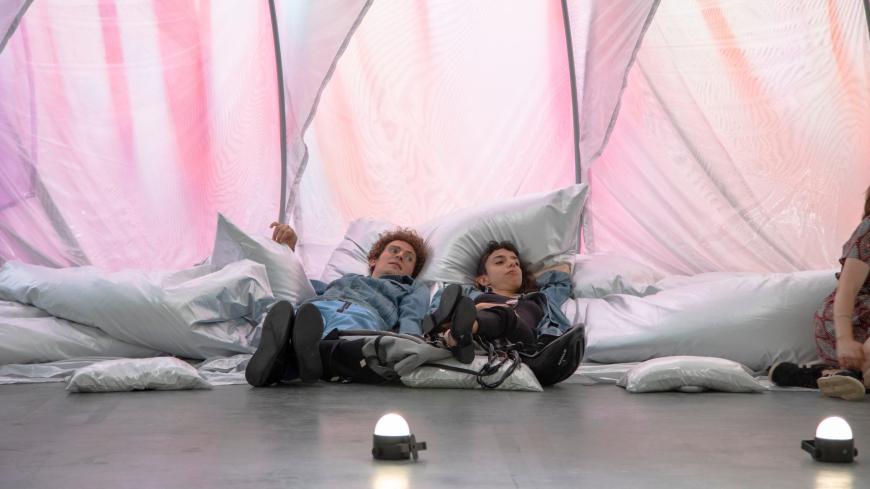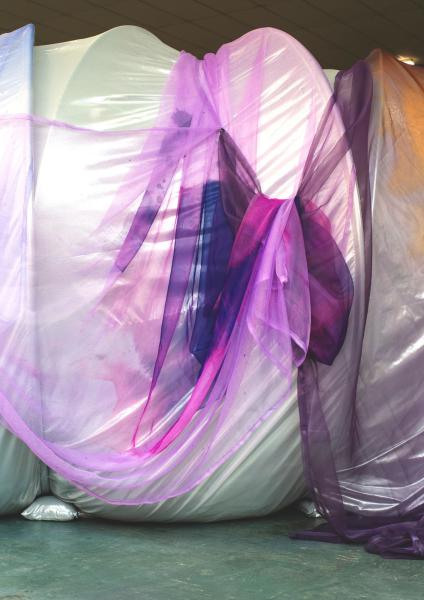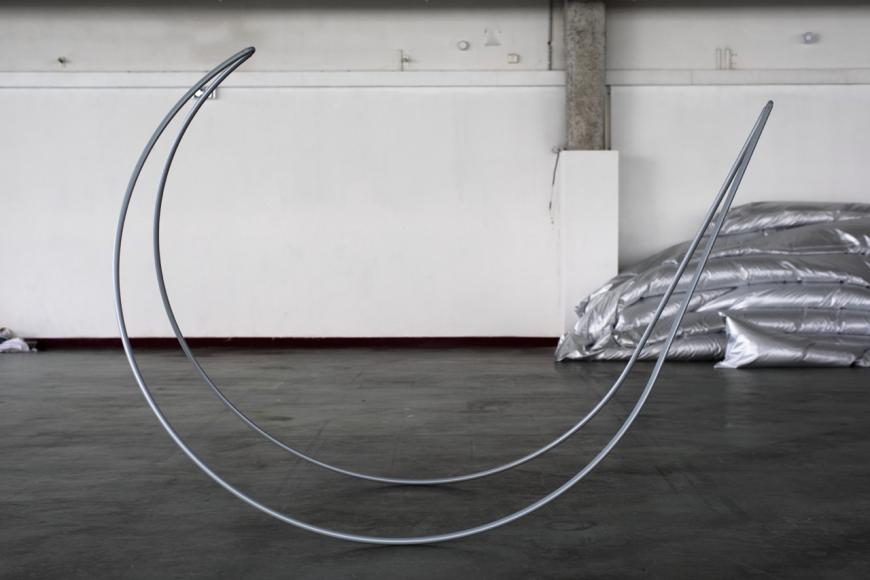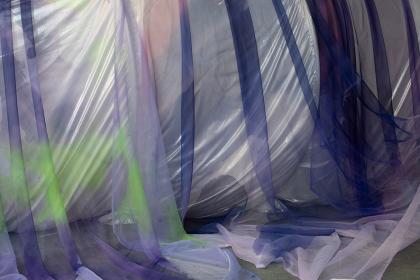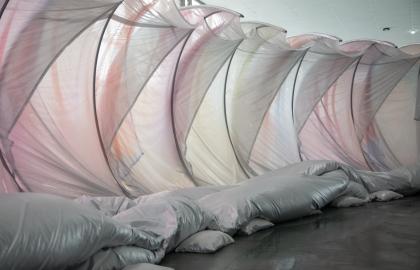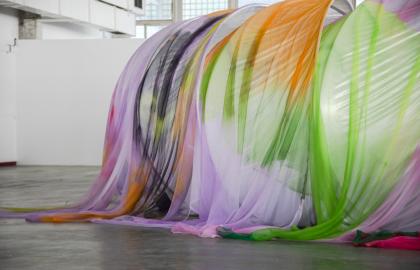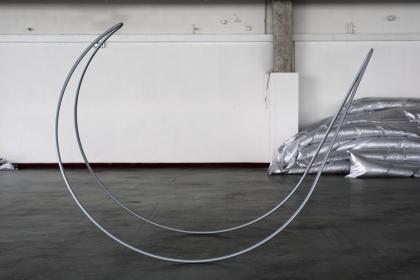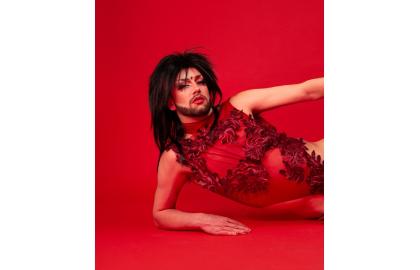How has the structure of Le Pavillon des Amours been designed to embody the values of openness and how do the architectural choices encourage horizontal and inclusive exchanges in concrete terms?
Le Pavillon, which I see as a spaceship, is designed to be a space for listening and exchange. It is a large circular structure made up of around thirty modules of curved metal tubing and fabric. These modules are arranged to form a whole, similar to segments of an orange, giving Le Pavillon the possibility to adjust its size according to the context. The architectural choices, made in collaboration with h2o architectes, have informed our respective thinking on mobile habitats and inclusive spacialisation. Inside, long cushions enable the audience to sit comfortably so as to facilitate “horizontal” listening. In visual terms, the design of the module – which we wanted to be thoughtful and welcoming – takes the shape of a heart, or parentheses, depending on the angle. Particular care has been taken with the prints on the exterior textiles, which are based on watercolours I created with my daughter. I wanted a chromatic range that could express, in a non-illustrative way, a broad emotional spectrum. The interior of Le Pavillon is silver, evoking science fiction and, by extension, a future we can invent together. With Emma Dumartherey and Safia Kessas, who supported me for the second edition here in Brussels, the main objective was to create a safe space in the Horta Hall. This was quite a challenge in such a vast and busy public space, but one that we have managed to pull off, thanks in particular to the layout and the work on the lighting.
Artist Laëtitia Badaut Haussmann has put together a selection of French-language podcasts that touch on the themes explored in Le Pavillon des Amours: relationships, sexual identities, friendships, and parenthood. The titles featured are the first episodes of series you'll be able to discover later on. This playlist isn’t meant to be exhaustive, but it complements the Pav.Lov. programme at Bozar and invites you to dive into reflections on love today :
What are the major societal issues that particularly resonate with the Pav.Lov. project?
Pav.Lov. was born out of the convergence of multiple concerns about current transformations: the #metoo wave, media developments around femicide, the rise of emancipatory voices in feminist writings and podcasts, children's rights, the persistence of patriarchal structures in institutions and public policies, and the urgent need to take preventive actions on sexual and gender-based violence and harassment (SGBV) among young people. How do we define love, kindness and friendship? What tools should we provide to children? On the aspects of patriarchal and capitalist conditioning, I wanted to examine the role of the private sphere. Since the 18th century, this has become the domain of the family based on a patriarchal understanding, placed under its authority and unofficially outside the framework of public law. It is a space in which what happens in it often remains unseen, particularly when it comes to emotions, affective relationships and also, unfortunately, various types of violence. It is a question of deconstructing what we have learned: what is individual, social, societal? This raises equality and minority rights issues. The aim of this project is to create a space for collective exchange, going beyond traditional formats such as literature, the written press or podcasts, which are limited to a “one-to-one” relationship.
Pav.Lov. does however include podcast listening sessions and practices such as guided meditation. How do these activities enrich the programme and the thinking on the themes covered?
I like the idea of recreating the atmosphere of a teenager's bedroom where you spend the afternoon with friends, in a convivial and relaxing setting, far from the public places of consumption. Le Pavillon is designed to be a trusted space of relaxation. Apart from parks and museums (which pose other challenges), there are few public spaces where people can simply be together. In this case, even though podcasts involve a form of consumption, they remain above all tools for relaxation and supporting reflection. Meditation was introduced, from the first edition, thanks to an extraordinary person who is both a psycho-practitioner in emotional intelligence and a Buddhist nun, who had offered a session on kindness, which was an outstanding experience. Through discussions with the Bozar teams, we came up with the Emergences collective, which quickly established itself. It was essential for Le Pavillon des Amours to accommodate people being together on different levels, recognising the importance of secular meditative practices for well-being, reconstruction and peaceful relations.
“I like the idea of recreating the atmosphere of a teenager’s bedroom where you spend the afternoon with friends”
The project examines the concept of “alternative stories” around love. What aspects would you like to deconstruct or reinvent through these discussions and performances?
There are lots of them! [laughs] I am interested in stories about friendship, especially when it enriches love in order to break away from the heteronormative household. Since the Enlightenment and the emergence of affective autonomy, the Western understanding of love and friendship have influenced our behaviour. Sociologist Eva Illouz talks about negative freedom and persistent subordination. Romantic love can become a trap for friendship, leading people to believe that “All you need is love” is enough, fuelling exclusive co-dependency and paving the way for toxic relationships. We are interconnected beings and need a variety of support for our mental, physical and economic well-being. In a chapter of her book “Nos puissantes amitiés”, Alice Raybaud looks at the evolution of friendship from childhood to adolescence, often still marked by prejudices linked to homosexuality; or conversely the systematic suspicions projected onto mixed friendships. bell hooks explores women’s relationship to love and friendship in mid-life, while Dana Kaplan and Eva Illouz analyse sexual capital as a social tool influencing aspects such as success and employability. It is essential to reconsider our relationship to desire, as well as how we cope with bereavement and depression: how can we build a community around these experiences, which today tend to isolate us? Returning to old rituals or creating new ones could help us. Subjects such as motherhood, the couple and the family are now attracting a great deal of attention, whether as a way of finally expressing things that have been left unsaid or as a way of proposing alternative stories, thus creating a toolbox for breaking free from these often deadly shackles.
Le Pavillon des Amours is not intended to replace these testimonies, but rather to act as an echo chamber, allowing people to talk and listen together.
Generally speaking, how do you select speakers to promote a diversity of perspectives and enrich discussions?
I worked closely with Safia Kessas from the Writers and Thinkers department to organise this edition. The discussions started quite early with Safia: I first shared with her the programme for the first edition, which took place in Paris, in 2023, so that we could start from a common base. We wanted to invite people with ties to Belgium, ideally living in or near Brussels.
Indeed, discussions about love in Brussels differ from those that might take place in southern Italy, for example. Each territory has its own cultural references, beliefs and political thinking, which influence perceptions of gender, sexuality and relationships, even in a globalised context.
Safia introduced me to many speakers I did not know, helping me to discover inspiring personalities through clear and enriching presentations. Working with her, a professional at collecting testimonies and organising interviews, was a valuable experience. Working alongside her on this project, which I initially came up with on my own, proved to be a very enriching experience.

